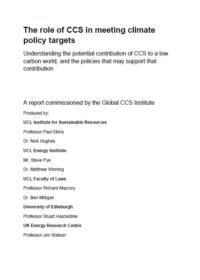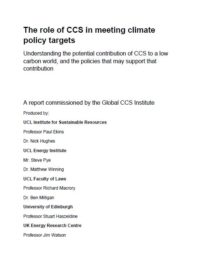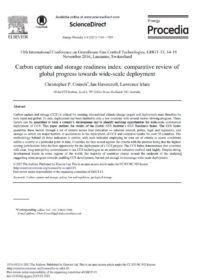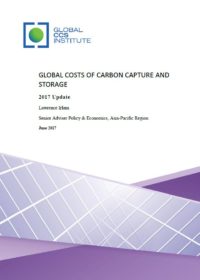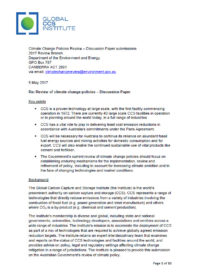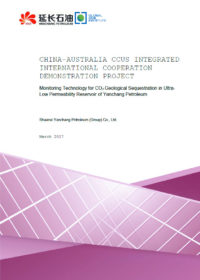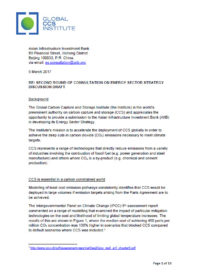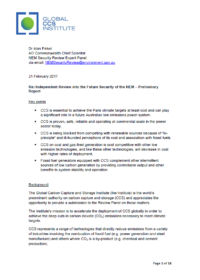Resources
Publications
Our publications, reports and research library hosts over 500 specialist reports and research papers on all topics associated with CCS.
View our Publication Library Disclaimer.
Filter by
Carbon capture and storage (CCS) refers to a set of technologies that may offer the potential for large-scale removal of CO2 emissions from a range of processes – potentially including the generation of electricity and heat, industrial processes, and the production of hydrogen and synthetic fuels. CCS has both proponents and opponents. Like other emerging low carbon technologies, CCS is not without risks or uncertainties, and there are various challenges that would need to be overcome if it were to be widely deployed. Policy makers’ decisions as to whether to pursue CCS should be based on a judgement as to whether the risks and uncertainties associated with attempting to deploy CCS outweigh the risks of not having it available as part of a portfolio of mitigation options, in future years.
Disclaimer
The content within the Global CCS Institute Publications, Reports and Research Library is provided for information purposes only. We make every effort and take reasonable care to keep the content of this section up-to-date and error-free. However, we make no claim as to its accuracy, currency or reliability.
Content and material featured within this section of our website includes reports and research published by third parties. The content and material may include opinions and recommendations of third parties that do not reflect those held by the Global CCS Institute.
The role of CCS in meeting climate policy targets
23rd October 2017
Topic(s): Carbon capture use and storage (CCUS)
Carbon capture and storage (CCS) refers to a set of technologies that may offer the potential for large-scale removal of CO2 emissions from a range of processes – potentially including the generation of electricity and heat, industrial processes, and the production of hydrogen and synthetic fuels. CCS has both proponents and opponents. Like other emerging low carbon technologies, CCS is not without risks or uncertainties, and there are various challenges that would need to be overcome if it were to be widely deployed. Policy makers’ decisions as to whether to pursue CCS should be based on a judgement as to whether the risks and uncertainties associated with attempting to deploy CCS outweigh the risks of not having it available as part of a portfolio of mitigation options, in future years.
Disclaimer
The content within the Global CCS Institute Publications, Reports and Research Library is provided for information purposes only. We make every effort and take reasonable care to keep the content of this section up-to-date and error-free. However, we make no claim as to its accuracy, currency or reliability.
Content and material featured within this section of our website includes reports and research published by third parties. The content and material may include opinions and recommendations of third parties that do not reflect those held by the Global CCS Institute.
Overview of Carbon Capture and Storage (CCS) Demonstration Project Business Models: Risks and Enablers on the Two Sides of the Atlantic
13th September 2017
Topic(s): Carbon capture use and storage (CCUS)
There are 15 large-scale CCS projects operating globally. Ten out of these fifteen projects, are located in North America [1]. The European Union's (EU) stated ambition was to have up to twelve operating CCS projects by 2015 [2], however this goal was not accomplished. The two projects currently operating storage in the European Economic Area, Sleipner and Snøhvit, are located in Norway. Because of this disparity in the number of projects operating in North America and in Europe – ten vs. two – we have analysed business models of major CCS projects in North America and in Europe, with an aim to identify risks and enablers in CCS project financing development on both continents. We find that successful CCS project development depends on multiple factors, such as (i) clarity of regulatory frameworks, (ii) efficiency of permitting processes, and (iii) early and sustained stakeholder engagement for public acceptance. However, project finance remain the most challenging piece.
Disclaimer
The content within the Global CCS Institute Publications, Reports and Research Library is provided for information purposes only. We make every effort and take reasonable care to keep the content of this section up-to-date and error-free. However, we make no claim as to its accuracy, currency or reliability.
Content and material featured within this section of our website includes reports and research published by third parties. The content and material may include opinions and recommendations of third parties that do not reflect those held by the Global CCS Institute.
Carbon capture and storage readiness index: comparative review of global progress towards wide-scale deployment
21st August 2017
Topic(s): Carbon capture use and storage (CCUS)
Carbon capture and storage (CCS) is critical for meeting international climate change targets and deployment must therefore be both rapid and global. To date, deployment has been limited to only a few countries with several factors slowing progress. These factors can be quantified to track a country’s development and to identify enabling opportunities for wide-scale commercial deployment of CCS. This paper outlines the results of the Global CCS Institute’s CCS Readiness Index. The CCS Index quantifies these factors through a set of criteria across four indicators — inherent interest, policy, legal and regulatory, and storage — which are major barriers or accelerators to the deployment of CCS and compares results for over 30 countries. The methodology behind all three indicators is similar, with each indicator employing its own set of criteria to assess conditions within a country at a particular point in time. Countries are then scored against the criteria with the premise being that the highest scoring jurisdictions have the best opportunity for the deployment of a CCS project. The CCS Index demonstrates that countries with clear, long-term policy commitments to use CCS technologies as an emissions reduction method rank highly. Despite strong development trends in some regions of the world, the majority of countries cluster around the midpoint of the analysis, suggesting some progress towards enabling CCS development, but not yet enough to encourage wide-scale deployment.
Disclaimer
The content within the Global CCS Institute Publications, Reports and Research Library is provided for information purposes only. We make every effort and take reasonable care to keep the content of this section up-to-date and error-free. However, we make no claim as to its accuracy, currency or reliability.
Content and material featured within this section of our website includes reports and research published by third parties. The content and material may include opinions and recommendations of third parties that do not reflect those held by the Global CCS Institute.
Current status of global storage resources
21st August 2017
Topic(s): Carbon capture use and storage (CCUS)
The successful deployment of carbon capture and storage as a means to mitigate greenhouse gas emissions requires the availability of significant geological storage capacity. Assessments that identify suitable sedimentary basins and their capacity are the first logical step in defining global carbon capture and storage potential. This paper presents a collation and summary of the current status of storage assessments worldwide known as the Global Storage Portfolio. The analysis found that there are substantial storage resources available in most regions of the world. Almost all nations that have published regional assessments have identified sufficient storage resources to support multiple carbon capture and storage projects. This analysis also found that the methods to determine and classify resources are highly variable across regions despite reliable assessment methodologies being available. Case studies on Europe and Southeast Asia discuss the different approaches being undertaken for their respective regional assessments and their progression towards being ready for the deployment of CCS.
Disclaimer
The content within the Global CCS Institute Publications, Reports and Research Library is provided for information purposes only. We make every effort and take reasonable care to keep the content of this section up-to-date and error-free. However, we make no claim as to its accuracy, currency or reliability.
Content and material featured within this section of our website includes reports and research published by third parties. The content and material may include opinions and recommendations of third parties that do not reflect those held by the Global CCS Institute.
Modelling for the Finkel Review – Implications for CCS in the Australian Power Sector
19th July 2017
The emissions reduction trajectory used in the Finkel Review modelling, by accommodating the Australian Government’s current 2030 target, is not consistent with a 2 or 1.5 degree outcome on which the business case for large scale CCS deployment heavily depends. This is the key element of the modelling that resulted in CCS (and other technologies) not being deployed. This Institute member briefing examines this and other modelling aspects in more detail, including 2 degree compliant scenarios examined earlier by the Climate Change Authority and by CSIRO.
Disclaimer
The content within the Global CCS Institute Publications, Reports and Research Library is provided for information purposes only. We make every effort and take reasonable care to keep the content of this section up-to-date and error-free. However, we make no claim as to its accuracy, currency or reliability.
Content and material featured within this section of our website includes reports and research published by third parties. The content and material may include opinions and recommendations of third parties that do not reflect those held by the Global CCS Institute.
Global Costs of Carbon Capture and Storage
4th July 2017
Topic(s): Carbon capture use and storage (CCUS)
This summary report presents data commissioned by the Global CCS Institute from Advisian (the consulting and advisory arm of WorleyParsons, a global engineering firm) of the current and likely future costs of CCS in power generation and industrial applications. The report provides cost estimates for CCS in seven industries, including power generation, iron and steel, cement and bio-ethanol production. Estimates are also provided for fourteen countries, including China, Germany, Canada, Indonesia, Morocco and South Korea.
The Institute commissioned this dataset to provide an independent and up-to-date reference for various stakeholders wishing to understand the cost and performance of facilities fitted with CCS technologies, including transport and storage. Standardised designs for each facility have been used and costs for these are transposed from the reference location to different countries, reflecting drivers such as local ambient conditions, labour rates and fuel cost and quality. The resulting cost estimates therefore involve a degree of uncertainty that is typical for studies of this type, but provide a sound representation of the likely cost of CCS using today’s commercially available technologies, as well as cost reductions possible from learning-by-doing and by using better technologies that are currently in various stages of development.
Disclaimer
The content within the Global CCS Institute Publications, Reports and Research Library is provided for information purposes only. We make every effort and take reasonable care to keep the content of this section up-to-date and error-free. However, we make no claim as to its accuracy, currency or reliability.
Content and material featured within this section of our website includes reports and research published by third parties. The content and material may include opinions and recommendations of third parties that do not reflect those held by the Global CCS Institute.
The opportunities to promote carbon capture and storage (CCS) in the United Nations Framework Convention on Climate Change (UNFCCC)
7th June 2017
The effective implementation of the Paris Agreement under the United Nations Framework Convention on Climate Change (UNFCCC) will strongly rely on its leverage of existing institutional arrangements under both the Convention and the Kyoto Protocol, as well as the complementarity of any future arrangements. This staff paper identifies, characterises and analyses how the UNFCCC’s formal communication channels (referred to as ‘vehicles’ in the paper) used to articulate national climate action pledges and response strategies can assist the further development and deployment of carbon capture and storage (CCS) technologies.
Disclaimer
The content within the Global CCS Institute Publications, Reports and Research Library is provided for information purposes only. We make every effort and take reasonable care to keep the content of this section up-to-date and error-free. However, we make no claim as to its accuracy, currency or reliability.
Content and material featured within this section of our website includes reports and research published by third parties. The content and material may include opinions and recommendations of third parties that do not reflect those held by the Global CCS Institute.
Institute submission to Australian Government review of climate policies
9th May 2017
Topic(s): Carbon capture use and storage (CCUS)
On 5 May the Institute lodged a submission in response to the Australian Government’s discussion paper on its review of climate change policies. This review is being undertaken at a critical time in the Australian energy and climate policy space, and is a stocktake of the Australian Government’s actions towards achieving Australia’s 2030 emission reduction targets and commitments under the Paris Agreement. The Institute’s submission points out the recent progress on large scale CCS facilities around the world and the important role of CCS in meeting Australia’s long-term emission reduction targets in a range of sectors. Central to this is providing policy parity to CCS, which will ensure emission reduction targets are met at least cost and with the optimal mix of technologies. The submission also makes broader recommendations for the Government’s review including the need to set legislated long-term targets that are supported by interim carbon budgets, periodic reporting of progress against targets and better coordination of state, territory and federal government policy.
Disclaimer
The content within the Global CCS Institute Publications, Reports and Research Library is provided for information purposes only. We make every effort and take reasonable care to keep the content of this section up-to-date and error-free. However, we make no claim as to its accuracy, currency or reliability.
Content and material featured within this section of our website includes reports and research published by third parties. The content and material may include opinions and recommendations of third parties that do not reflect those held by the Global CCS Institute.
Monitoring Technology for CO2 Geological Sequestration in Ultra-Low Permeability Reservoir of Yanchang Petroleum
29th March 2017
Topic(s): CO2 storage
To promote the development of CCS in China, the Global CCS Institute and China National Development and Reform Commission (NDRC) held a joint carbon capture, utilisation and storage (CCUS) workshop in Yan’An China in July 2013. Out of this collaboration the Global CCS Institute has commissioned Yanchang Petroleum Group to produce four knowledge-sharing reports on its integrated CCS project.
The third report of the series discusses the monitoring and verification technologies and techniques of Yanchang Petroleum CCUS Project. It highlights project achievements, lessons learned and the future monitoring workplan.
Disclaimer
The content within the Global CCS Institute Publications, Reports and Research Library is provided for information purposes only. We make every effort and take reasonable care to keep the content of this section up-to-date and error-free. However, we make no claim as to its accuracy, currency or reliability.
Content and material featured within this section of our website includes reports and research published by third parties. The content and material may include opinions and recommendations of third parties that do not reflect those held by the Global CCS Institute.
Institute submission on Asian Infrastructure Investment Bank (AIIB) Energy Sector Strategy
7th March 2017
On 6 March the Institute lodged a submission to the Asian Infrastructure Investment Bank (AIIB) regarding its Energy Sector Strategy. The AIIB is a multilateral development bank which commenced operations in January 2016, with the aim of meeting the significant financing needs for infrastructure and economic development across Asia. Its Energy Strategy will be vitally important in guiding the investments of the AIIB and its financing partners across the full suite of technologies that will deliver sustainable, clean energy in the Asia region. As the Institute’s submission points out, the need for CCS in developing countries is significant, owing to a likely continued dependence on fossil fuels as a pathway to economic development, combined with energy demand that is growing at a far greater pace than in developed countries. The Institute’s submission highlights prospects for CCS in several Asian countries and the work already undertaken by the Institute to improve the prospects of CCS deployment in various countries through its Capacity Development activities. The submission also presents analysis on the co-benefits of CCS including job creation and preservation, and addressing localised pollution.
Disclaimer
The content within the Global CCS Institute Publications, Reports and Research Library is provided for information purposes only. We make every effort and take reasonable care to keep the content of this section up-to-date and error-free. However, we make no claim as to its accuracy, currency or reliability.
Content and material featured within this section of our website includes reports and research published by third parties. The content and material may include opinions and recommendations of third parties that do not reflect those held by the Global CCS Institute.
Independent Review into the Future Security of the National Electricity Market – Preliminary Report
24th February 2017
Topic(s): Energy efficiency
In October 2016, in the wake of a major blackout in the state of South Australia, the Council of Australian Governments directed the country’s chief scientist, Dr Alan Finkel, to draft a blueprint for energy security in the National Electricity Market.
Consultation on this blueprint covers a broad range of issues facing the Australian electricity market, primarily centred around how to ensure the delivery of electricity that is clean, reliable and affordable. The review is taking place during a period of heightened political and community concern over electricity price increases, the exit of traditional coal generation, increasing penetration of intermittent forms of renewable power, and high degrees of carbon and policy risk which are inhibiting investment in other much needed technologies. Recommendations arising from this review will factor into a broader review of Australia’s climate policy to take place over 2017.
The Institute provided its submission to this review of the electricity market on 21 February 2017. It contains analysis demonstrating that CCS is necessary among a full suite of options in achieving a low emissions power grid at least cost, that it can complement intermittent sources of renewable power, and it is cost competitive with the full range of generation and energy storage options being considered.
Disclaimer
The content within the Global CCS Institute Publications, Reports and Research Library is provided for information purposes only. We make every effort and take reasonable care to keep the content of this section up-to-date and error-free. However, we make no claim as to its accuracy, currency or reliability.
Content and material featured within this section of our website includes reports and research published by third parties. The content and material may include opinions and recommendations of third parties that do not reflect those held by the Global CCS Institute.
